Contest #240 What a Dinner Party: a Hero, a Double-Nobel, a Lunatic, a Rebel... and Hozier (Eng/Esp)
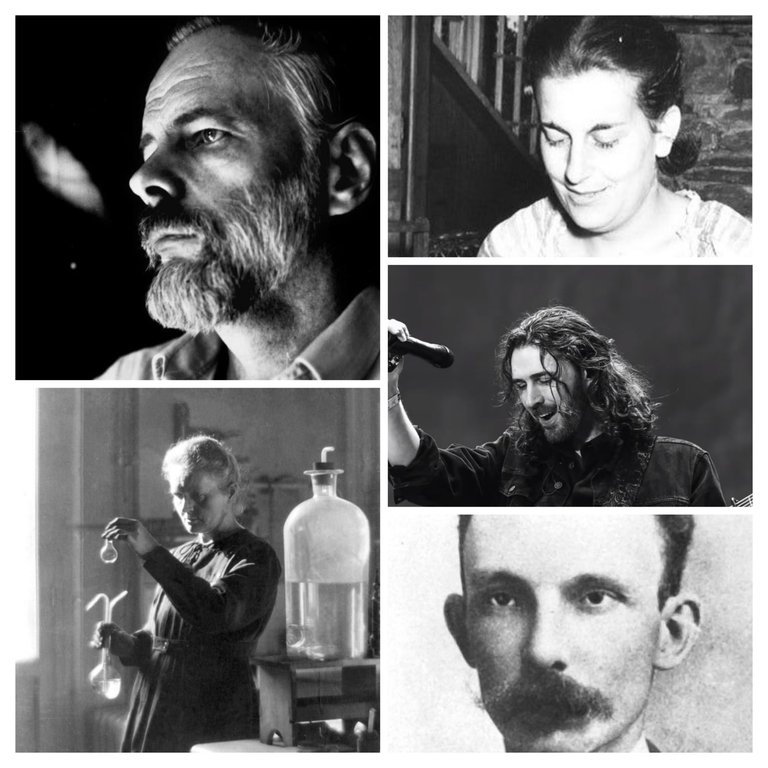
I wasn’t going to participate in this challenge, but @honeydue got me all fired up, so I thought, "Why not?" The truth is, I don’t have idols anymore. I’ve watched them fall one by one—thanks to this era where we refuse to let skeletons stay quietly in the closet (and that’s a good thing). At 29, I’ve learned it’s not wise to meet the people you admire in person 😂. So the real challenge for me is: Who do I still want at my dinner table?
José Martí
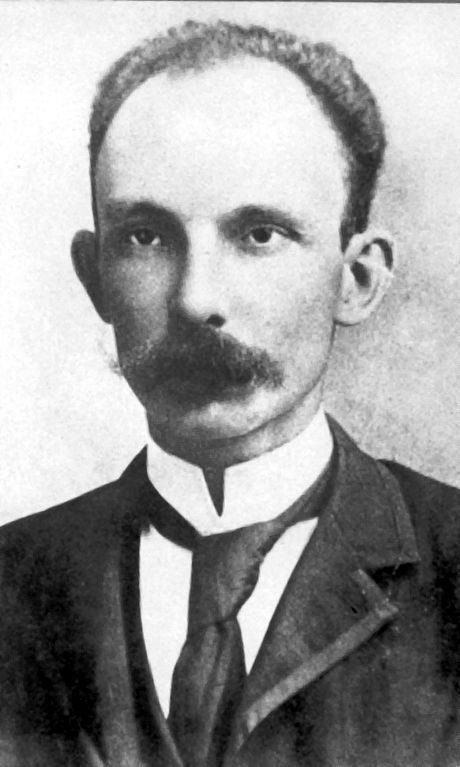
The national hero of my country, Cuba. An exceptional poet, a razor-sharp journalist, a diplomat, a politician, and above all, a man of relentless energy. Where did he get it from? No one knows. A friend’s book—Las enfermedades de Martí (The Illnesses of Martí) by neurosurgeon Ricardo Hodelín (a must-read)—reveals how the horrors of political imprisonment and forced labor (at just 16 years old!) marked Martí’s health for the rest of his tragically short life. He lived only 42 years, yet he accomplished more than most do in a century.
He reignited Cuba’s fight for independence (The Necessary War, 1895-1898). He could write about anything in a way anyone could understand, and his political speeches prove that a poet moving a crowd achieves more than any political scientist with all their tactics. If you don’t know Martí, read him. Start with his poetry, then dive into everything else. Trust me, it’s worth it.
Marie Curie
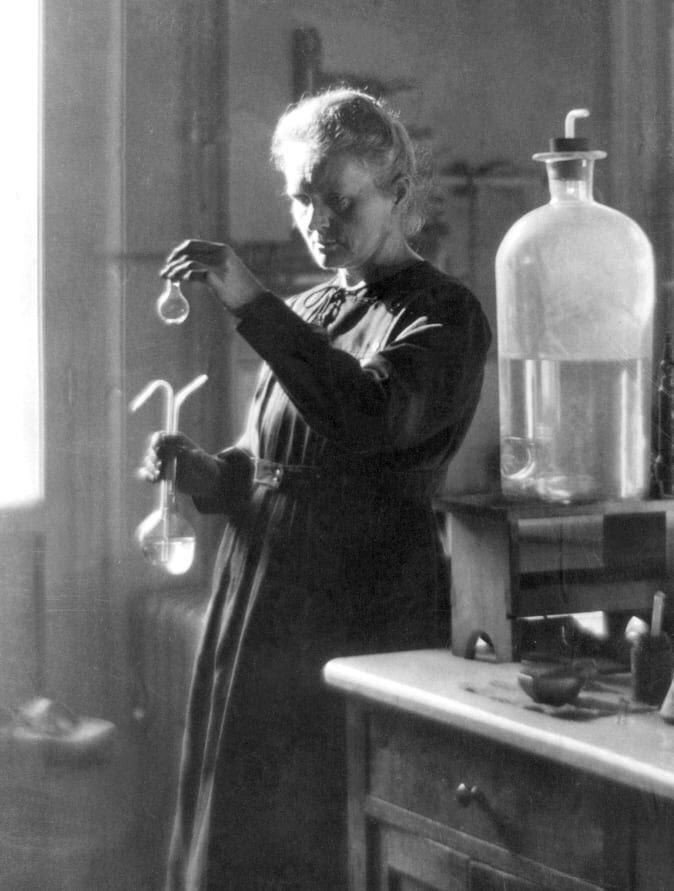
I’m a little worried about inviting the great Marie—she might bring some serious radioactivity to the table 🤪. I don’t know how well we’d get along, but she has to be there.
Let’s skip past the fact that she was the first person ever to win two Nobel Prizes in different scientific fields (Physics in 1903, shared with Pierre Curie and Henri Becquerel for their work on radioactivity, and Chemistry in 1911, solo, for isolating radium and polonium). She discovered two elements, coined the term "radioactivity," and pioneered medical breakthroughs (like mobile X-ray units in World War I). Just that résumé alone is legendary.
Oh, and she was the first female professor at the University of Paris (Sorbonne)—back when people would’ve rather told her to "go wash dishes" than pick up a microscope. After her husband’s death, gossip swirled about her relationships, because apparently, a woman’s private life matters more than her Nobel-worthy achievements (shocking, right? 😒). Marie knew what it meant to fight an entire worldview—and win.
Philip
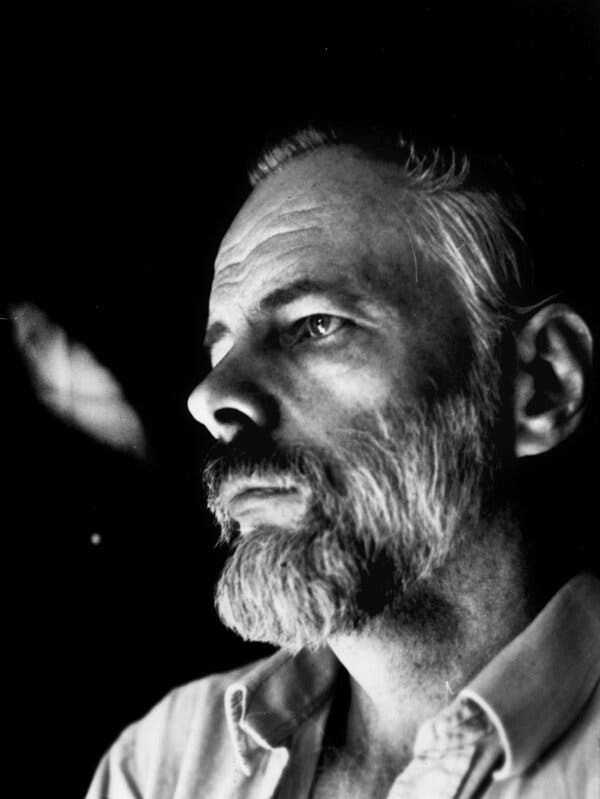
That’s what I call him—affectionately. The mad sage of sci-fi. Philip K. Dick was religious in his own way, utterly paranoid, half-mystic, and by the end of his life, certifiably bonkers. Yet, like many "crazy" people, time proved him right about… well, a lot of things.
When I started writing sci-fi, I hadn’t read Philip, but people kept saying I was copying him. Then I did read him and realized: I wasn’t imitating him—I was just as nuts as he was 🤣.
Philip K. Dick obsessed over the illusory nature of reality and the fragility of human identity. In his dystopian worlds, governments, corporations, and tech warp perception until no one knows what’s real, who to trust, or even what it means to be human. His conclusion? "Reality is that which, when you stop believing in it, doesn’t go away." (Though his characters rarely figured it out.) His paranoia wasn’t baseless—it critiqued a world where power thrives on cognitive manipulation. If he saw the internet, he’d drop dead.
For Philip, empathy was the core of humanity. His replicants showed more compassion than humans numbed by consumerism or Cold War propaganda. His antiheroes resisted Kafkaesque bureaucracies with existential irony or tiny acts of rebellion. To him, God might’ve been an alien satellite, and paranoia? Just survival instinct: "You’re not crazy if reality is actually out to get you."
His quiet influence is in ALL the sci-fi you consume today. Read him.
Judith Merril
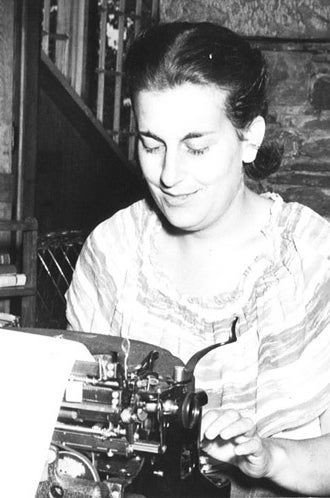
The woman who discovered that genius. A revolutionary force in sci-fi, she smashed gender barriers with radical political vision. An author herself (forced to use male pseudonyms by sexist editors), she reinvented the genre as we know it.
She coined the term "Speculative Fiction" to break free from male-dominated "pulp" tropes, making space for psychology, social critique, and domestic narratives. As editor of Year’s Best S.F. (1956–1968), she championed marginalized voices like Philip K. Dick and Ursula K. Le Guin—only for her contributions to be erased by the same gatekeepers who’d once rejected those voices.
Her activism against sci-fi’s "boys’ club" cost her dearly. In the ’60s, she called out how women were relegated to "wives of writers" or "muses" (editors literally censored female characters who were "too important" or—gasp—had personalities). When she published Daughters of Earth (1968), a feminist anthology exploring patriarchal dystopias, male critics labeled her "paranoid" and "hysterical."
Her most famous line? "If you want to change the future, first imagine someone like you existing in it." Tell me that isn’t relevant right now.
Hozier

Look, we needed someone alive at this table. Here’s why: he’s a brilliant poet, deeply sensitive, and clearly well-read. He grashes nuance—the kind of perspective that comes from real knowledge. His song "No Plan" is a hymn to that clarity: there are two ways to face our mortality (and the universe’s). You can weep, or you can finally relax. He chose the latter—thanks to a female astrophysicist’s wisdom.
I doubt plates will fly at this dinner… unless, like @honeydue, Dylan Thomas crashes the party at midnight.

No iba a participar en este reto, pero @honeydue acabó por entusiasmarme, así que dije "por qué no". La razón es que ya no me quedan ídolos. He visto caer uno por uno, por diversas cosas, en esta época en que nos negamos a dejar los esqueletos tranquilamente dentro del armario (y eso está bien). A los 29 he aprendido que no es bueno conocer en persona a quien quieres admirar 😂 Por tanto, el verdadero reto para mí es: a quiéntodavía quiero tener en una cena.
José Martí
El Héroe Nacional de mi país, Cuba. Un poeta excepcional, periodista de altura, diplomático y político, y sobre todo, un tipo incansable. De dónde sacaba tanta energía, nadie sabe. Un libro de un amigo (Las enfermedades de Martí", del doctor en neurocirugía Ricardo Hodelín, librazo) demostró que los rigores de un presidio político con trabajos forzados (¡apenas con 16 años!) marcaron la salud de Martí por el resto de su corta vida. Vivió 42 años, nada más, pero hizo muchísimo.
Fue el hombre que nos llevó nuevamente a luchar por nuestra independencia (Guerra Necesaria, 1895-1898). Sabía de todo un poco, era capaz de escribir cualquier cosa para que lo entendiera cualquier persona, y sus discursos políticos son la evidencia de que un poeta moviendo a la multitud logra más que cualquier experto en politología con todas sus técnicas. Si usted no conoce a Martí, léalo. Empiece por la poesía y luego busque todo lo demás. Créame, vale la pena.
Marie Curie
Hablando de ciencia. Me preocupa tener a la gran Marie pues quizá nos traiga una carga de radiactividad potente a nuestra cena 🤪 . No sé qué tal me lleve con Marie, pero ella tiene que estar.
Quitando el hecho de que es la primera persona en recibir dos Premios Nobel en distintas disciplinas científicas (Física en 1903, compartido con Pierre Curie y Henri Becquerel, por sus investigaciones sobre la radiactividad; y Química en 1911, en solitario, por el aislamiento del radio y el polonio). Descubrió dos elementos químicos nuevos, acuñó el término "radiactividad" para describir el fenómeno que investigó, y demostró aplicaciones médicas revolucionarias de sus hallazgos (como los primeros equipos de rayos X móviles en la Primera Guerra Mundial). Ya por ahí el currículum está de lujo.
Además, fue la primera mujer profesora en la Universidad de París (Sorbona) en una época en que en su propia cara la mandaron a lavar los platos, mejor. Al quedar viuda, le cuestionaron sus relaciones con nombres, al parecer era más importante su vida privada que sus logros científicos (que eso le suceda a una mujer, vaya, qué raro 😒). En fin que Marie sí supo lo que es lograr algo con toda una cosmovisión y una época en contra.
Philip
Le digo así, de cariño. Philip K. Dick, el loco sabio de la Ciencia Ficción. Philip era religioso a su manera, paranoico total, medio místico, hacia el final de su vida estaba loco como una cabra y aun así, como muchos locos, el tiempo demostró que tenía razón en muchas cosas. Cuando empecé a escribir Ciencia Ficción, no había leído a Philip y sin embargo, muchos me decían que lo estaba imitando. Luego lo leí, y entendí que yo no lo imitaba (simplemente porque no lo conocía), sino que quizá estaba tan loca como él 🤣
Philip K. Dick exploró obsesivamente la naturaleza ilusoria de la realidad y la fragilidad de la identidad humana. En universos reales y distópicos donde gobiernos, corporaciones o tecnologías distorsionan la percepción, sus personajes nunca saben qué es real, a quién creerle, qué es ser realmente humanos, etc. Llegó a la conclusión de que "la realidad es aquello que, cuando dejas de creer en ello, no desaparece"... aunque sus protagonistas rara vez lograban distinguirla. Esta paranoia no era gratuita: reflejaba su crítica a un mundo donde el poder se ejerce mediante la manipulación cognitiva. Qué vigente, el hombre. Llega a ver internet y se muere.
Dick indagó en qué nos hace humanos. Para él, la empatía era el núcleo ético: replicantes podían mostrar más compasión que humanos desensibilizados por el consumismo o la guerra fría. Sus antihéroes, víctimas de burocracias kafkianas, resistían con ironía existencial o pequeños actos de rebeldía. Dios podía ser un satélite alienígena, y la paranoia, un mecanismo de supervivencia: "No estás loco si la realidad realmente te persigue".
La influencia silenciosa de Philip está en TODA LA CIENCIA FICCIÓN que consumes ahora mismo. Habría que leerlo.
Judith Merril
Es la mujer que descubrió semejante talentazo. Fue una fuerza transformadora en la ciencia ficción, desafiando las barreras de género con una mirada política radical. Ella misma fue autora, usando seudónimos masculinos impuestos por editores que rechazaban voces femeninas, y como editora reinventó el género desde sus cimientos.
Acuñó el término "Speculative Fiction" para liberar la narrativa de los límites del "pulp" tecnocéntrico dominado por hombres, abriendo espacio a la psicología, la crítica social y temáticas domésticas ignoradas. Como editora de las influyentes antologías Year’s Best S.F. (1956-1968), descubrió y promovió a figuras marginadas como Philip K. Dick y Ursula K. Le Guin, méritos que luego fueron silenciados y apropiados por la misma gente que antes rechazaba esas voces.
Su activismo confrontó el machismo estructural de la ciencia ficción con una ferocidad que pagó con el ostracismo. En los años 60, denunció públicamente que el género operaba como un "boys' club", donde las autoras eran relegadas al rol de "esposas de" o "musas" (había editores que censuraban cualquier personaje femenino demasiado importante para la trama o con, dios no lo permita, personalidad propia. Cuando publicó Daughters of Earth (1968) —una antología explícitamente feminista que exploraba opresión de género y distopías patriarcales—, la crítica masculina la tildó de "paranoica" e "histeria política".
Su frase más célebre: "Si quieres cambiar el futuro, primero debes imaginar que alguien como tú existe en él". Díganme que eso no está vigente ahora mismo.
Hozier
Hombre, ya hacía falta otro vivo en esta mesa. Tengo mis razones: es un gran poeta, muy sensible, se nota que ha leído mucho y de todo un poco. Es capaz de ver los matices y entiende la perspectiva que te da el conocimiento como lo entiendo yo. La canción "No Plan" es un canto a esa perspectiva: hay dos maneras de afrontar el conocimiento de nuestra mortalidad y la de nuestro Universo, una es llorar y la otra es sentir que al fin podemos relajarnos. Él decide lo segundo, y ¿quién lo convenció? Pues una astrofísica.
No creo que en esa mesa vuelen los platos a no ser que, como le pasó a @honeydue, Dylan Thomas se cuele a mitad de la noche.
View or trade
LOHtokens.@gaviotawriter, You have received 1.0000 LOH for posting to Ladies of Hive.
We believe that you should be rewarded for the time and effort spent in creating articles. The goal is to encourage token holders to accumulate and hodl LOH tokens over a long period of time.
You received an upvote ecency
Martí te hubiera bajado muela, de eso no hay duda.
!BBH
Probablemente yo me lo hubiera comido primero. Era sexy el condenao
🤣🤣🤣🤣
🤭🤭🤣
Congratulations @gaviotawriter! You have completed the following achievement on the Hive blockchain And have been rewarded with New badge(s)
Your next target is to reach 15000 upvotes.
You can view your badges on your board and compare yourself to others in the Ranking
If you no longer want to receive notifications, reply to this comment with the word
STOPCheck out our last posts:
!LADY
View or trade
LOHtokens.@hive-124452, you successfully shared 0.1000 LOH with @gaviotawriter and you earned 0.1000 LOH as tips. (5/50 calls)
Use !LADY command to share LOH! More details available in this post.